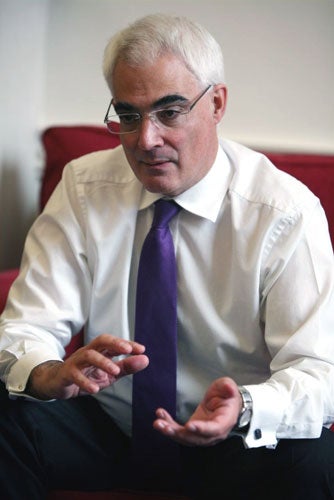Darling gets sums wrong as gloom deepens

Your support helps us to tell the story
From reproductive rights to climate change to Big Tech, The Independent is on the ground when the story is developing. Whether it's investigating the financials of Elon Musk's pro-Trump PAC or producing our latest documentary, 'The A Word', which shines a light on the American women fighting for reproductive rights, we know how important it is to parse out the facts from the messaging.
At such a critical moment in US history, we need reporters on the ground. Your donation allows us to keep sending journalists to speak to both sides of the story.
The Independent is trusted by Americans across the entire political spectrum. And unlike many other quality news outlets, we choose not to lock Americans out of our reporting and analysis with paywalls. We believe quality journalism should be available to everyone, paid for by those who can afford it.
Your support makes all the difference.Alistair Darling may be forced to revise his forecast that the economy will start to grow again from next summer amid fears that his prediction is already proving too optimistic.
A month ago, the Chancellor said growth would resume in the second half of 2009 after contracting for four successive three-month periods. But other ministers fear the worse-than- expected banking crisis and "terrible" jobless figures will make the recession last longer than Mr Darling forecast in his pre-Budget report (PBR).
Some ministers believe he will have to paint a bleaker picture of the nation's prospects for 2009 when he delivers his Budget in March or April. That, in turn, could force the Treasury to revise upwards his huge borrowing figure of £118bn for next year, since tax revenues may be lower and spending on state benefits higher than expected.
Last month, the Chancellor said the economy would contract by between 0.75 and 1.25 per cent next year, in line with Bank of England forecasts but more optimistic than several independent analysts. Economists at Capital Economists predicted a 2.5 per cent contraction, the deepest downturn since 1947.
Treasury sources said it was "premature" to speculate about the growth forecast for next year so soon after the PBR. Officials insisted there was no reason to think that last month's predictions would be proved wrong but said the Chancellor would provide an update in his Budget.
Fears that he will issue a more gloomy forecast increased when the Office of National Statistics (ONS) announced that the economy shrank faster than it previously thought between July and September. It said it contracted by 0.6 per cent, the biggest fall for 18 years, rather than 0.5 per cent as it originally estimated.
However, there was relief at the Treasury that the ONS did not revise its zero growth figure for the previous three months. If it had done so, Britain would now be officially in recession, which is defined as two successive quarters of negative growth. A recession will be formally confirmed in January when the figures for the final quarter of 2008 are released.
There was more gloom as the number of mortgage approvals fell to a new record low of 17,773 last month, down 14 per cent on the previous month and 61 per cent down on November last year, according to the British Bankers Association. There was also a prediction that the property market collapse still had two years to run and that house prices would eventually drop by 35 per cent.
Opposition parties seized on the revised figure for the third quarter of this year, which was affected by a slide in the services sector and manufacturing. George Osborne, the shadow Chancellor, said: "Here is further evidence that Labour is bankrupting Britain again. Not only have we been in recession for six months but it is now deeper than we thought." Vince Cable, the Liberal Democrats' Treasury spokesman, warned that the coming recession "will be deeper and steeper" than the Government believed.
Stephen Timms, a Treasury minister, admitted the revised output figure was "poor" but said it was not surprising. "What we need to do at this difficult time is to support the economy. Every country is affected by what is happening in the world economy, no one is immune," he said.
Olivier Blanchard, chief economist at the International Monetary Fund, said the Government's temporary cut in VAT was "not a good idea" as it did not give consumers a "real incentive to spend". However, he urged Germany to adopt a bigger fiscal stimulus to boost Europe's economy as a whole.
The Treasury replied: "The VAT cut will not only put an additional £12.5bn into the economy at a time when it's needed most, it will benefit consumers and businesses through lower prices and increased sales. A household spending £900 a month on VAT-able goods will find that they've got £20 more left in their pocket at the end of the month, and for many people that's a significant difference."
Join our commenting forum
Join thought-provoking conversations, follow other Independent readers and see their replies
Comments